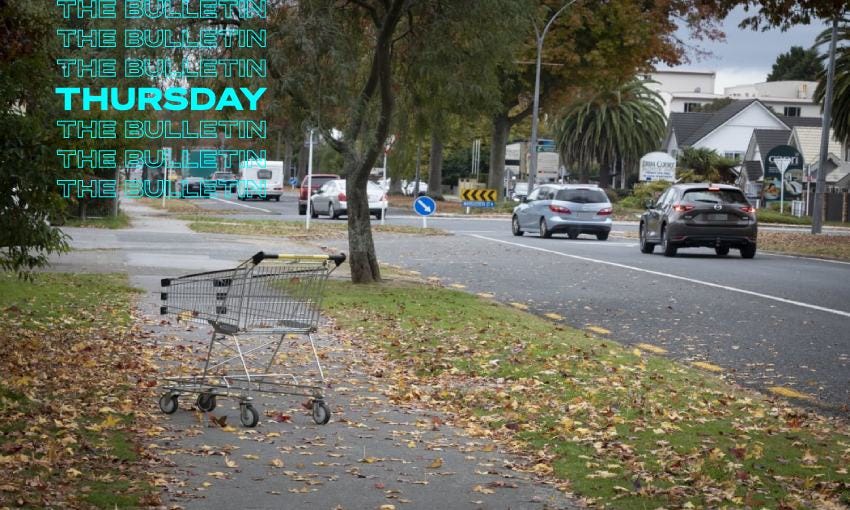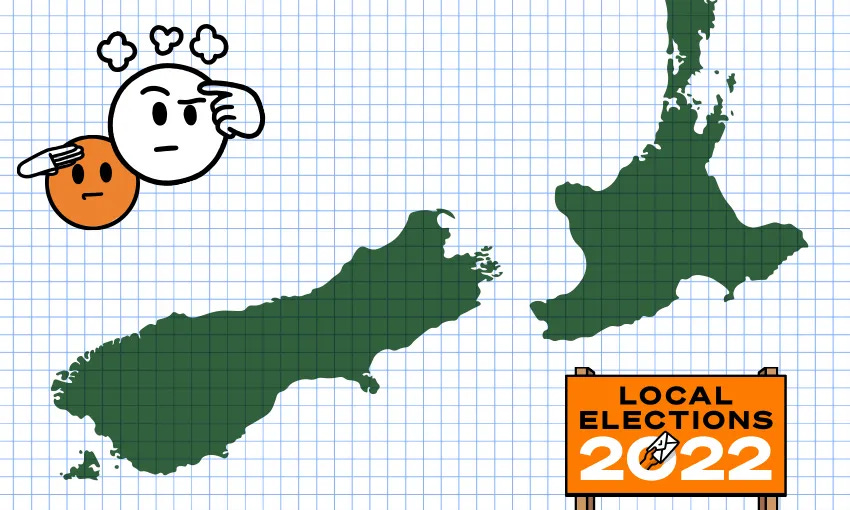The wicked problem that is our housing crisis
A story for TVNZ’s Sunday on the use of motels in Rotorua as emergency housing unleashes a political blame game and highlights the vulnerability of those who just want somewhere to live
Mōrena and welcome to The Bulletin for Thursday, September 8, by Anna Rawhiti-Connell. Presented in partnership with Z Energy.
In today’s edition: City Rail Link completion date won’t be confirmed until end of year; Māori media strategy released; Lotto’s plans for an online gambling game; but first, the emergency housing story that’s driven the news agenda this week.
Fenton Street in Rotorua (Image: RNZ)
Shine gone from Golden Mile
I slammed my laptop shut after watching Golden Mile, Kristin Hall’s exposé on the use of motels in Rotorua as emergency housing and made a noise that prompted a colleague to ask if I was ok. “It’s just so grim,” I said. Grim but important work that I watched and went home to my house and its heat pump. In 2018, prime minister Jacinda Ardern addressed the United Nations and talked about facing “wicked problems”. Wicked problems are those that do not have a simple solution owing to complexity or interconnectedness, and where solving one aspect of the problem may create other problems. At the end of 2018, 10,712 households were waiting for state or social housing. As of August, 27,036 households are now on the public housing waitlist. Housing is one of the most wicked problems facing New Zealand and Hall’s story is an example of just how wicked it is.
Profiting from misery
If you haven’t yet watched Golden Mile, do. Duncan Greive has recounted his experience of watching it, reminding us of the power of television current affairs programmes to drive the news agenda. Hall’s story details allegations of gang members working for the private security company working in the motels. The company is now under investigation and is run by the CEO of the charity Visions of a Helping Hand, a provider of emergency housing in the area and the focus of Hall’s story. It has been paid nearly $14m by government departments to provide emergency housing. It operates two motels in Rotorua and is contracted to look after eight more. By the end of June this year, the government had spent $1b on emergency housing. Just 83 providers (out of 1540) accounted for half of that spend. Ultimately, there’s an underlying sense that there is profit to be made from other people’s misery and in offering piecemeal solutions to wicked problems.
Te Pāti Māori and National call for an inquiry
The story has kicked off a political blame game. The government maintains it’s not an ideal situation but motels are better than a car or garage. Not an incorrect point but tenants featured in Hall’s story actually moved into their cars to avoid being intimidated and harassed by the security guards. The Ministry of Housing and Urban Development says it’s “satisfied” that Visions of a Helping Hand is delivering on its contract. Te Pāti Māori has called for an inquiry and National have joined them in that call. Opposition leader Christopher Luxon says the government is in denial and that they need to use community housing providers to increase housing supply. The government has said they were dealing with a state housing shortage when they took power in 2017, while Luxon says National aren’t to blame. The Human Rights Commission is horrified and wants to talk to those living in the motels in Rotorua.
40 kilometres away, workers have gone without pay for weeks
Not far from Rotorua is Kawerau, where workers at the Essity paper mill were locked out a month ago and are now negotiating with the multi-billion dollar corporation for a pay rise to help keep up with inflation. The spectre of poverty and emergency housing looms there too, the area becoming something of a microcosm for our wicked problems. Stewart Sowman-Lund visited the town to find the mill quiet, the gates locked. One woman he spoke to said that she had friends who worked at the mill. “It’s sad,” she said, lifting off her sunglasses. “I think they’ve had to seek emergency housing.” Sowman-Lund will have a report from the Rotorua mayoral candidate debate tomorrow where emergency housing was discussed.
This month we’re celebrating eight years of The Spinoff. We’ve come a long way since 2014 and that is in no small part thanks to our members – we literally wouldn’t be here today without them. Their generous support underpins all our work and has meant we are able to cover more areas of life in Aotearoa, to tackle more stories about our people and issues impacting our communities. From our ongoing coverage of inequality and the cost-of-living crisis, to political reporting and our focus on te ao Māori, it’s important mahi and we can’t do it without you. Let’s keep a good thing going - tautoko mai, donate today.
No completion date or final cost of City Rail Link until end of the year
I am genuinely excited about the City Rail Link (CRL) in Auckland but am eager to know when it might be completed. The Spinoff’s Chris Schulz went along to a media event yesterday with the prime minister at the site of the rail link’s Te Waihorotiu station. The prime minister struggled to be heard over construction noise but Schulz managed to pick up on officials saying they won’t have announcements to make on a final end date or cost until the end of the year. “Current Covid-related impacts, and those before, are of a scale and uncertainty we could not have reasonably predicted a couple of years ago” said CRL chief executive Sean Sweeney. There is still plenty of hard work ahead. Once Dame Whina Cooper, the tunnel boring machine gets to Te Waihorotiu station and finishes digging out the twin train tunnels, more than 16km of train tracks and 1500km of cabling still need to be laid.
Māori media strategy released
If you cast your minds back to May and an edition of The Bulletin that looked at a few stories behind Budget 2022, you might remember RNZ’s Mediawatch asking where the Māori media strategy was. The government agreed to spend $40m on the strategy at the 2022 Budget, after a $42m investment in the 2021 Budget. Yesterday broadcast minister Willie Jackson released a Cabinet paper outlining his three-year strategy for the Māori media sector. The strategy is aimed at "normalising and revitalising" te reo Māori and included direct funding for Whakaata Māori – Māori TV. The proposed changes are part of broader reform of the public media sector.
If you love The Spinoff, our newsletters are a great way to stay connected to what we’re about. We publish a range of great newsletters including ones on specific topics like business (Stocktake), food (The Boil Up), the environment (Future Proof) as well as wraps of our best work, The Spinoff Daily and The Weekend. If you liked what you read today, share The Bulletin with friends, family and colleagues.
Click and collect
Late payments costing small businesses hundred of millions of dollars.
Government won’t commit to political-promise costings unit before the next election.
Woman at centre of Northland's 2021 lockdown wants apology from the government.
Trevor Mallard trespassing Winston Peters from parliament during protests cost nearly $24,000.
Police issue warning about drugs following death of 20 year old and ahead of a music festival in Queenstown.
Got some feedback about The Bulletin, or anything in the news? Get in touch with me at thebulletin@thespinoff.co.nz.
Analysis by Policy.nz shows how contested (or not) council and mayoral elections are around the country. Toby Manhire and Emma Vitz crunch the numbers to see how much competition is there for your vote. Nicola Harvey writes about becoming a farmer and a climate activist. Chris Schulz has 10 things you should know before travelling overseas again. And Tara Ward bestows Dame Susan Devoy with Celebrity Treasure Island legendhood status just one week into the show's new season.
What this year’s sports journalist of the year has learned after striking out on his own
When I first started writing The Bulletin, I accidentally moved the sports news and that was a very foolish error for which I apologised. Many Bulletin readers are avid sports fans so Dylan Cleaver’s The Bounce is a godsend for me. Cleaver picked up sports journalist of the year at the Voyager media awards last month. That’s no small feat for anyone, let alone someone striking out on their own. This week, The Bounce is celebrating its first birthday. Cleaver has written about the first year and included some highly relatable comments about mistakes and clunky syntax. It's a funny and honest reflection on his first year and sports journalism in general - I recommend it.
To celebrate this milestone, Cleaver is offering Bulletin subscribers 20% off the cost of subscribing to his award-winning exercise in being an independent sports journalist. Just use this link to take him up on his offer.
Lotto stories that aren’t about how big the jackpot is
A couple of longer reads for you today. On Monday RNZ’s Guyon Espiner revealed that Lotto stores in the poorest half of New Zealand account for 70% of Lotto’s sales. Today Espiner has details of a plan for Lotto to make $25m a year via the introduction of an Bingo online game. Maria Bellringer, director of Auckland University of Technology's gambling and addictions research centre and a member of Lotto's expert advisory panel, wants the company to ditch the idea. Bellringer says making Bingo highly accessible by putting it online, is going to increase the risk of harm for Māori and Pacific communities."










